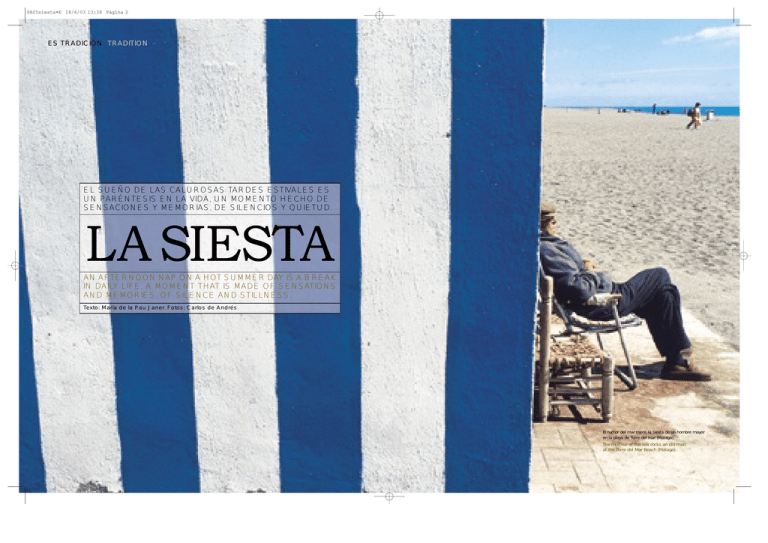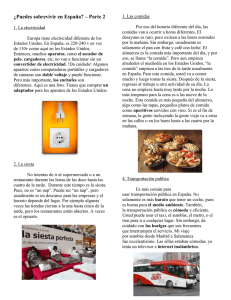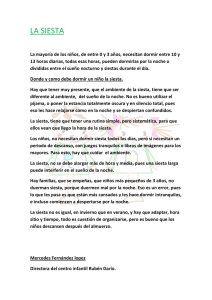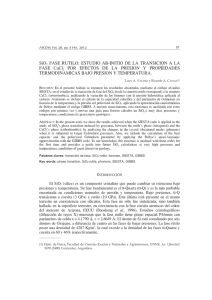el sueño de las calurosas tardes estivales es un paréntesis en la
Anuncio

PA05siesta•E 18/6/03 13:38 Página 2 ES TRADICIÓN TRADITION EL SUEÑO DE LAS CALUROSAS TARDES ESTIVALES ES UN PARÉNTESIS EN LA VIDA, UN MOMENTO HECHO DE SENSACIONES Y MEMORIAS, DE SILENCIOS Y QUIETUD. LA SIESTA AN AFTERNOON NAP ON A HOT SUMMER DAY IS A BREAK IN DAILY LIFE, A MOMENT THAT IS MADE OF SENSATIONS AND MEMORIES, OF SILENCE AND STILLNESS. Texto: María de la Pau Janer. Fotos: Carlos de Andrés El rumor del mar mece la siesta de un hombre mayor en la playa de Torre del Mar (Málaga). The murmur of the sea rocks an old man at the Torre del Mar Beach (Málaga). PA05siesta•E 18/6/03 13:38 Página 4 ES TRADICIÓN TRADITION Cualquier ocasión es buena para una siesta. De izda. a dcha: turistas en el Generalife (Granada); descanso en una piscina de Zahara de la Sierra (Cádiz) y un sueño en La Caleta de Vélez (Málaga). Anytime is a good time for a siesta. From left to right: tourists in El Generalife (Granada); rest time at a swimming pool in Zahara de la Sierra (Cádiz); a sleep in La Caleta de Vélez (Málaga). se alargan los días, el mundo se transforma. A medida que crece la luz, somos distintos. Nos parecemos a aquellos animales camaleónicos que cambian según los colores del paisaje: pueden adquirir el verde de la hierba o modificarlo por el gris de una rama desnuda, seca. Nuestra metamorfosis es más intensa, porque se desdibujan los ritmos propios del mundo que habitamos, del espacio, del tiempo. La siesta surge como consecuencia de los días largos, del sol, de todo aquello que descubrimos, una vez más, diferente. the days are longer; the world is transformed. As the light day increases, we change. Like the chameleonic animals whose colours change to adapt to the landscape: they can be green like the grass one minute and grey like a dry, bare branch the next. Our metamorphosis is more intense, as the rhythm of the world in which we live becomes blurred in time and space. The afternoon nap came about as a result of long, hot days, of all that looks different to us each time we rediscover it. Me refiero, por supuesto, a la Siesta en mayúscula, a ese desconectarse del mundo porque nos gana un sueño que nos mece y adormila. Como si alguien nos cantara bajito canciones muy antiguas, o como si nos explicasen un cuento al oído. Un cuento lleno de palabras susurrantes que se confunden en la placidez del sueño, que forman una materia única, hecha de sonidos cuyo significado da lo mismo, porque sólo transmite sensaciones gratas. Está claro que en invierno muchas personas aprovechan para echar una cabezadita después de la comida. Pero ese reposo casi momentáneo de los sentidos no tiene nada que ver con la siesta propia del buen tiempo y los días largos. Esa otra, la auténtica, está hecha de sopores y de pensamientos que se aquietan. Es la sensación de detener la vida por un paréntesis para saborearla mejor, con más intensidad. ‘TAKING A NAP IS LETTING YOURSELF BE CARRIED AWAY BY INERTIA OF ETERNAL DAYS’. Cuando When ‘DORMIR LA SIESTA ES DEJARSE LLEVAR POR UNA INERCIA QUE SABE A DÍAS ETERNOS’. I'm referring, of course, to a real nap, the kind where we disconnect from the world when drowsiness overtakes us, rocks us and puts us to sleep. As though someone were softly singing us an old lullaby or telling us a story. A story full of whispered words that run together in the placidness of sleep, that form a single matter of sounds whose meaning is unimportant, because they transmit only pleasant sensations. Obviously, there are many people who doze off briefly after lunch even in the winter. But that almost momentary resting of the senses is nothing like the real ‘siesta’ that comes with the good weather and long days. That one, the real one, is made of drowsiness and calming thoughts. The feeling that life is standing still just for a moment to savour it longer, more intensely. Dormir la siesta es ganarle un pulso a la vida que es prisa y movimiento en exceso, que es desconfianza e inquietud. Dormir la siesta es dejarse llevar por una inercia que sabe a días eternos y a conversaciones que se interrumpen para dar paso al silencio. Un silencio donde caben los sueños, aquellos que surgen cuando dormimos o aquellos otros que imaginamos cuando todavía percibimos el mundo, justo antes de que se borren todos los objetos y las presencias que nos rodean. Taking a nap in the afternoon helps us win the battle against the hurries and excess movements of daily life, the distrust and unease. Taking a nap in the afternoon, we are carried away by the inertia of long days and inter-rupted conversations that give way to silence. Silence where dreams are allowed, the ones we have when we sleep or the ones that we imagine while still awake, just before we become unaware of the objects and the people around us. Cuando era muy pequeña, mi abuelo dormía la siesta tumbado en el sofá de la sala. Era una costumbre suya que repetía un día tras otro, con una meticulosidad rigurosa. Tenía poco pelo y nunca le gustó demasiado que se lo alborotasen. Si mi abuela se lo desordenaba, reaccionaba con un murmullo de protestas sin fin. Ella le decía que era un hombre gruñón y se enzarzaban en discusiones pueriles que no duraban nunca demasiado. Conservo pocos recuerdos de él. El tiempo ha ido difuminándolos como borra aquellas historias que no volverán a repetirse. Suele suceder, aunque sea una pena. ‘ERA VERANO Y EL SOL DEVORABA LA ISLA DONDE NACÍ. SE LA COMÍA POCO A POCO’. Sin embargo, me acuerdo de sus siestas. Era verano y el sol devoraba la isla donde nací. Se la comía poco a poco, en un festín de calores y de horas plácidas. Mientras mi abuelo dormía, yo aprovechaba para hacerle mil peinados, que transformaban aquellos escasos cabellos grises en una selva. Su pelo se convertía en una selva de juncos y hierba. Él movía los labios en un gruñido casi imperceptible, entre la consciencia y la inconsciencia, permitiendo mis desmanes. Nunca hizo un solo ademán para impedirme aquellos gestos que hoy recuerdo como un ritual perdido, lejano. Sus protestas eran suaves como el ronroneo de un gato o como las olas del mar. Un día, se marchó en un coche, nos dijo hasta luego y no volvió jamás. Su nombre pasó a engrosar las listas de los muertos en accidentes. A mí, me dejó el recuerdo de esas siestas eternas y de mis juegos a su lado. Mª de la Pau Janer. Nacida en Palma de Mallorca en 1966, es escritora, doctora en Filología Catalana y en 2002 fue finalista del Premio Planeta. Mª de la Pau Janer. Born in Palma de Mallorca in 1966, she is a writer, holds a PhD in Catalan Philology and was finalist of 2002 Planeta Award. When I was very little my grandfather would take a nap on the sofa in the living room. It was a habit that he repeated faithfully day after day. He had little hair and he didn't like it to be out of place. If my grandmother messed it up, he reacted with an endless murmur of protests. She would say that he was grumpy and they would get into childlike arguments which didn't last too long. I have few memories of him. They have faded with time, which has a way of blotting out the histories that will never be repeated. ‘IN SUMMER THE SUN DEVOURED THE ISLAND WHERE I WAS BORN, EATING IT LITTLE BY LITTLE.’ But I do remember his siestas. It was summer and the sun devoured the island where I was born, eating it up little by little, in a feast of heat and placid hours. While my grandfather would sleep, I would arrange his hair, transforming the few grey hairs into a jungle. His hair would become a jungle of reeds and grass. He would move his lips in an almost imperceptible grunt between consciousness and unconsciousness, allowing my outrageous behaviour to continue. He never made a single gesture to stop me from what I now remember as a long lost ritual. His protests were gentle like the purring of a cat or the murmur of ocean waves. One day, he said good-bye to us and left in the car, never to come back. His name became just one more on the list of the victims of traffic accidents. He left me with the memory of those eternal siestas and the games I would play by his side. Carlos de Andrés. Madrileño (1954) y ejemplo del mejor fotoperiodismo, publica en medios de todo el mundo y es autor de varios libros de fotografía. Carlos de Andrés. Born in Madrid (1954), his photographs are published in media from all over the world and had published several photography books.


